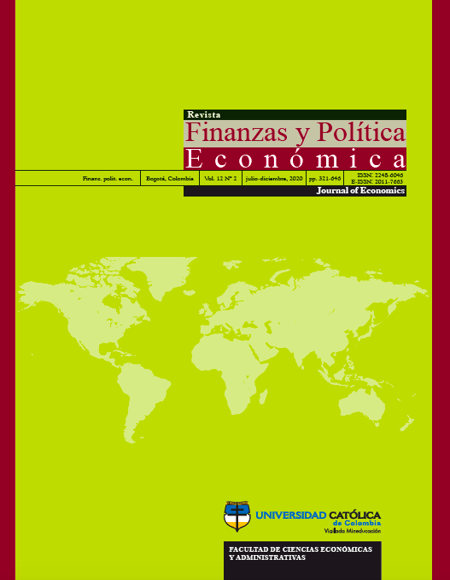This journal is licensed by a Creative Commons Attribution License (CC BY-NC-SA 4.0) Attribution-Non Commercial 4.0 International. For the CC licenses, the principle isthe creative freedom. This system complements the copyright without opposing it, conscious of its importance in our culture. The content of the articles is the responsibility of each author, and does not compromise in any way, to the journal or the university. It allows the transmission and reproduction of titles, abstracts and full content, with academic, scientific, cultural ends, provided acknowledgment of the respective source. This work cannot be used for commercial purposes.
They journal does not charge authors for submission or publication.
Abstract
This paper presents an approach to rationality from Keynes’ perspective, broadened in the concept of animal spirits and their interaction with investors’ expectations. It is exemplified by a VEC econometric model, which shows that investment expectations, in particular for Colombia, become positive in the face of past-year investment and income shocks; and negative, in the face of confidence index and interest rate shocks. It suggests changes for behavioral economics in favor of financial well-being projected in public policies.
Keywords

References
Akerlof, G. y Shiller, R. (2009). Animal Spirits: Cómo influye la psicología humana en la economía. Barcelona: Gestión 2000 y Grupo Planeta.
Akerlof, G. A. y Kranton, R. (2010). Economía de la identidad: cómo nuestras identidades dan forma a nuestro trabajo, salarios y bienestar. Princeton: Princeton University Press.
Akerlof, G. A. y Shiller, R. G. (2015). Phishing for phools: The economics of manipulation and deception. Princeton: Princeton University Press. https://www.scopus.com/inward/record.uri?eid=2-s2.0-84977110651&partnerID=40&md5=5b22f1e6e6596b7b42e9ccaaf124731
Anand, P. (2006). Development in utility theory as a paradigm language game. En B. Gerrard (Ed.), The economics of rationality (pp. 15-25). Londres: Taylor & Francis e-Library.
Arias, E. y Torres, C. (2004). Modelos VAR y VECM para el pronóstico de corto plazo de las importaciones de Costa Rica. https://doi.org/10.1016/j.ecoenv.2011.12.007
Banco de la República de Colombia (2019a). ¿Qué es producto interno bruto PIB? http://www.banrep.gov.co/es/contenidos/page/qu-producto-interno-bruto-pib
Banco de la República de Colombia (2019b). Inflación total y meta. http://www.banrep.gov.co/es/estadisticas/inflacion-total-y-meta
Banco de la República de Colombia (2019c). Tasas de colocación. http://www.banrep.gov.co/es/estadisticas/tasas-colocacion
Bidder, R. M. y Smith, M. E. (2012). Robust animal spirits. Journal of Monetary Economics, 59(8), 738-750. https://doi.org/10.1016/j.jmoneco.2012.10.017
Crespo, R. (2005). El pensamiento filosófico de Keynes: descubrir la melodía. Madrid: Ediciones Internacionales Universitarias Madrid.
Cuevas, H. (2004). Fundamentos de la economía del mercado. Bogotá: Universidad Externado de Colombia. https://books.google.com/books?id=HM2SPwAACAAJ&pgis=1
Departamento Administrativo Nacional de Estadística (2019). Cuentas nacionales anuales. Glosario. https://www.dane.gov.co/index.php/estadisticas-por-tema/
cuentas-nacionales/cuentas-nacionales-anuales/glosario-cuentas-nacionales-anuales
Fedesarrollo (2019). Encuesta de Opinión Empresarial (EOE). https://www.fedesarrollo.org.co/encuestas/empresarial-eoe
Fuentes, D. (2010). Animal Spirits. Cómo influye la psicología humana en la economía. Revista de Economía Institucional, 12(22), 307-313. Recuperado de http://www.scielo.org.co/pdf/rei/v12n22/v12n22a16.pdf
Gerrard, B. (2006). Beyond the logical theory of rational choice. En B. Gerrard (Ed.), The Economics of Rationality (pp. 37-48). Londres: Taylor & Francis e-Library.
González, L., Velasco, F., Gavilán, J. M. y Sánchez, L. M. (2010). The similarity between the square of the coefficient of variation and the Gini Index of a General Random Variable. Revista de Métodos Cuantitativos para la Economía y la Empresa, 10(1), 5-18.
Gujarati, D. y Porter, D. (2010). Econometría (5.ª ed.). Ciudad de México: McGraw Hill. https://econometria101.files.wordpress.com/2013/02/econometria-damodar-ngujarati.pdf
Hey, J. (2010). Rationality is as rationality does. En B. Gerrard (Ed.), The Economics of Rationality (pp. 4-14). Taylor & Francis e-Library.
Hodgson, G. (2006). Calculation, habits and action. En B. Gerrard (Ed.), The Economics of Rationality (pp. 26-36). Taylor & Francis e-Library.
Keynes, J. M. (1921). A treatise on probability. Nueva York: Dover Phoenix Editions.
Keynes, J. M. (1930). A treatise on money. Londres: MacMillan.
Keynes, J.M. (1930). Economic possibilities for our grandchildren. Nueva York: W.W. Norton y Co.
Keynes, J. M. (1936). Teoría general de la ocupación, el interés y el dinero. Ciudad de México: Fondo de Cultura Económica.
Lora, E. y Prada Ríos, S. I. (2016). Técnicas de medición económica : metodología y aplicaciones en Colombia (5.ª ed.). Cali: Universidad ICESI. http://repository.icesi.edu.co/biblioteca_digital/handle/10906/80745
Lorente, L. (2018). La explicación causal en economía. Revista de Economía Institucional, 20(39), 9-51. https://doi.org/10.18601/01245996.v20n39.02
Mata, H. L. (2004). Nociones elementales de cointegración. Procedimiento de Engle-Granger. [Notas de cátedra]. http://webdelprofesor.ula.ve/economia/hmata/Notas/Engle Granger.pdf
Novales, A. (2017). Modelos vectoriales autorregresivos (VAR). Madrid: Universidad Complutense. https://www.ucm.es/data/cont/media/www/pag-41459/VAR.pdf
Ocampo, J. A. (1983). De Keynes al análisis post-keynesiano. Bogotá: Fedesarollo. https://www.repository.fedesarrollo.org.co/bitstream/handle/11445/1579/Repor_Abril_1983_Ocampo.pdf?sequence=3&isAllowed=y
Sunstein, C. R. (2019). El ascenso de la economía del comportamiento: Misbehaving de Richard Thaler. Revista de Economía Institucional, 21(41), 5-20. https://doi.
org/10.18601/01245996.v21n41.01
Tejedor-Estupiñan, J. (2020). La economía conductual, un campo multidisciplinar. Revista Finanzas y Política Económica, 12(1). http://doi.org/10.14718/revfinanzpolitecon.v12.n1.2020.3402
Thaler, R. H. (2018). From cashews to nudges: The evolution of behavioral economics. American Economic Review, 108(6), 1265-1287. https://doi.org/10.1257/aer.108.6.1265
Transparency International (2015). Corruption perceptions. Index 2015. https://www.transparency.org/cpi2015
Vásquez, F. y Reyes, G. (2019). Relación existente entre el crecimiento económico, la corrupcióny la competitividad global en 20 países latinoamericanos y sus tratados de integración. RevistaEspacios, 40(27), 27-41. http://www.revistaespacios.com/a19v40n27/19402727.html
Winslow, T. (2006). Keynes on Rationality. En B. Gerrard (Ed.), The Economics of Rationality (pp. 64-87). Londres: Taylor & Francis e-Library.






























